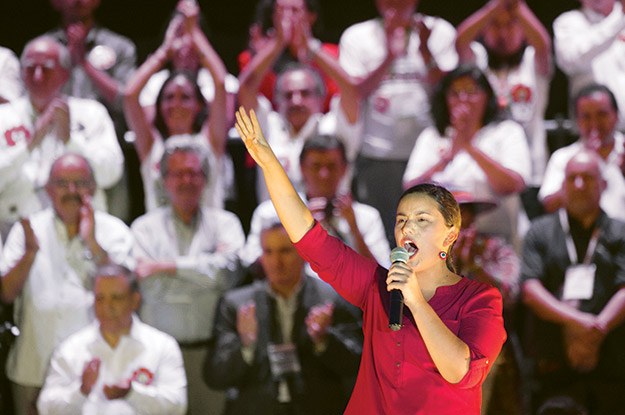This article is adapted from AQ’s most recent issue, “Fixing Brazil.” To see the rest of our Top 5, click here.
Verónika Mendoza had been a congresswoman in Peru for less than a year when she decided to break with the ruling Nationalist Party she’d spent nearly a decade helping to build. Then-President Ollanta Humala was sending police to Andean towns to control protests against global mining companies, hardening her suspicions about the government’s rightward shift.
After two campesinos died in unrest near a mine in her region of Cuzco in May of 2012, Mendoza called First Lady Nadine Heredia, a founder of the party and a key advisor to Humala. “She told me we couldn’t mess with the mining lobby,” recalled Mendoza, a Quechua-speaking anthropologist before she delved into politics. “I’d already decided to leave the party, but that confirmed for me that it was the right decision.”
It wasn’t the first time Mendoza and other young progressive Peruvians felt like “political orphans.” At 35, Mendoza has never seen a bona fide leftist in the presidential palace, in part because the bloody Maoist-inspired Shining Path insurgency in the 1980s and 1990s left Peruvians with little appetite for leftist political ambitions well into this century.
But Mendoza may be changing that. Last year, Mendoza launched a quiet bid for the presidency and surprised even herself when she almost overtook Pedro Pablo Kuczynski, now the country’s new president, in a crowded first-round election. While she didn’t make the run-off, her strong showing in the polls helped the Broad Front, the coalition she cofounded in 2013, win more seats in Congress than Kuczynski’s centrist Peruvians for Change party.
“She was the big threat to us getting into the second round,” said Carlos Bruce, a spokesman and congressman for Kuczynski’s party. “She really made very few mistakes in the campaign … she connected with people in a way few others can.”
At a time when leftist movements in other South American countries are running out of steam, Mendoza has stoked hopes, and fears, that a modern, more electable left may be taking root in Peru. But as she herself pointed out, the personality-driven “caudillismo” practiced by left-wing leaders like Venezuela’s Hugo Chávez and his successor, Nicolás Maduro, is outdated and undemocratic.
“The left has to be in touch with reality, not abstracted by dogmatisms,” Mendoza told AQ. “It has to be connected to the people, ready to adapt to their needs.”
Mendoza expects to run for president again in 2021, five years the wiser. So far, she’s made nearly all the right moves to position herself as a responsible option. Most notably, she swallowed her distaste for Kuczynski, a former investment banker, to back him in his run-off battle with Keiko Fujimori, the daughter of the country’s right-wing former authoritarian president. That helped edge him into power with the narrowest of leads.
Mendoza champions diversifying Peru’s economy away from mining, replacing the 1993 constitution passed by Alberto Fujimori’s government, and safeguarding rights for indigenous groups, women, and members of the LGBT community.
As Mendoza spoke with AQ, Kuczynski was meeting with Venezuelan opposition leader Henrique Capriles during his visit to Peru. The Broad Front was getting slammed for not backing a motion in Congress expressing solidarity with Venezuelans, dismissing the move, rather, as a ploy from the right to score political points. Mendoza admitted it was a lost opportunity to display her vision for a different kind of leftist movement. Her coalition should have “taken the initiative” with its own motion condemning human rights violations in Venezuela. Maduro, she added, should have heeded calls for a referendum “a long time ago.”
“The new left that we’re building must be a party of dialogue,” she said. In 2021, Peruvians may have a chance to judge whether she means what she says.
—
Taj is a reporter for Reuters based in Lima.





